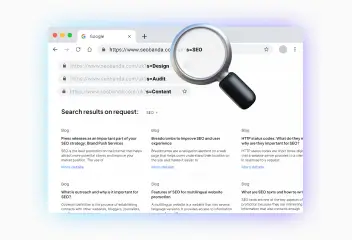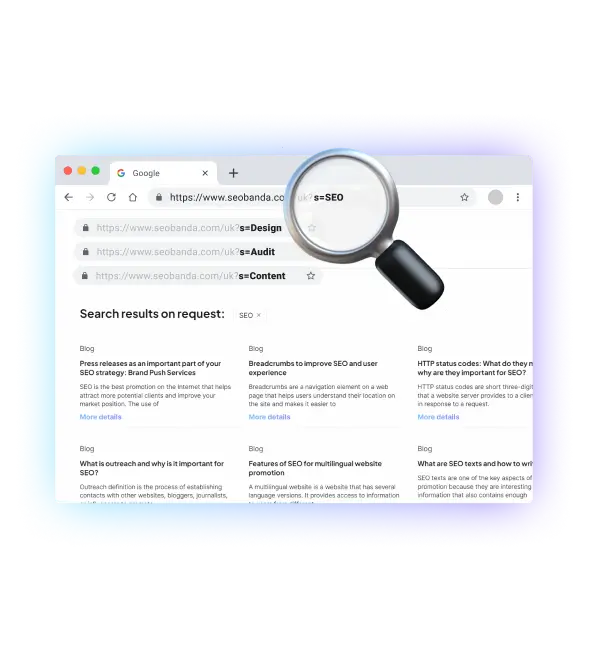

An example of how to use search operators
In the process of analyzing certain pages during SEO promotion, it is very often necessary to find information on a specific site or, on the contrary, specific information on various online resources, and search operators come to our aid!

The best example of search commands is the “site” operator followed by the name of the site. In this case, Google will search for the word you need only on this site.
Another useful operator is “intitle”. It allows you to search only those pages that have your query in the title.

There are also operators that allow you to remove certain words from the search results, or search for words in an inaccurate order on the pages. So let’s take a closer look at the types of search operators and what they are used for.

Increase visibility
for your business: SEO solution for growth!


Types of Google search operators and their capabilities
| Title | Definition | Usage |
| site: | This search operator allows you to limit your search to only one site. | This is useful when you need to find information on this particular resource. |
| intitle | helps to search for pages whose titles contain the phrase or word we need. | This search operator helps users quickly find the materials they are interested in. |
| inurl | This Google operator works in a similar way to the previous one, but it shows pages in the url address of which contain the words or phrases you need. | This is especially useful for specialists who memorize the url rather than the page content for easy navigation. |
| filetype | allows you to search for files of a particular type, such as documents, images, audio, or video. This is useful when you’re looking for a picture. You can significantly narrow down the search results and get exactly what you were looking for. By the way, people search for images quite often, but not everyone knows that in order for an image to be indexed, it needs to be optimized. You can read more about image optimization here. | Useful when you need to limit the search to a specific file type. |
| related: | is a very interesting search operator. When you enter it into Google, for example, “related:wikipedia.org”, the system will try to find sites that are related to this site. This connection can be very different: similar content, content, the same topics or audiences. The related operator requires search engines to provide information you are interested in, based on the site you specify. | Useful when you need to find information based on the information provided on the specified site |
| link: | allows you to find all pages that contain links to the specified url. | This is very useful for analyzing backlinks to your resource and researching those sites that link to you. |
| define: | This search operator allows you to get a direct definition of the term you are looking for. As a rule, this query provides information from several resources. This is very useful when you need to know what a word means, but you don’t want to read too much information. | Useful when you want to receive only a response to your request and nothing more |
| cache: | This search operator allows you to see the cached version of the page stored in Google. | This can come in handy when a page is temporarily unavailable but you want to see its content. |
| * (asterisk) | is used to replace one or more words in a search query. For example, “SEO* site”. In this case, the system will show you sites that contain the words “SEO” and “site” and have any other word between them. | This is useful when you don’t remember exactly what you’re looking for, or you’ve simply forgotten a word. |
| – “minus” | This Google operator is used to exclude a word from the search results. For example, “apple-fruit” will show you all pages that contain the keyword apple, except for those that contain the word fruit. | This operator is used when you need to find information with the exception of some words |
| | (vertical line) | is used to search for results that contain one of several specified words. For example, “pizza|sushi” will show you pages with both pizza and rolls. | Use when you have a choice or need to find several products at once |
| ( ) | this search operator specifies the order of actions (as in mathematics). That is, the query “(apple|orange) pie” searches for pages that contain the phrase “apple pie” or “orange pie”. | You can use this search operator when you have already used several others |
| “ ” (double quotes) | This search command indicates that you are looking for pages that contain your query in exactly the same form. For example, the query “”apple pie“” will show you pages that contain the words “apple pie” in the exact same order. | This operator should be used when looking for an exact phrase |
| in: | is used to limit the search to only one type of content. For example, “in:pdf” will only show you PDF files, while “in:images” will only show you images. You might think that this search operator has the same function as “filetype”, but there are a few differences. “filetype” only indicates the type of file. “filetype:doc” or “filetype:pdf”. While “in” is a bit broader and can specify a specific type of content. That is, the “in:images” query will show all images, regardless of format (JPG, PNG, GIF, etc.), and the “in:pdf” query will only show pdf files. | It is also used when you need to find files of a specific type, like “filetype”, but has a slightly wider range of uses. |
| map: | allows you to search for results on maps based on your query. For example, the query “map:New York” will show you New York City on Google Maps and everything related to it. | Useful when you need to find something near you |
| before: | This search operator is used to search for pages created before the specified date. For example, “before:2022-01-01” will limit the search results to pages created before January 1, 2022. | This search operator is used when you need to find older information |
| after: | is the opposite function to the previous search operator. “after:2022-01-01” will show you pages created after January 1, 2022. | After is used to find new relevant information accordingly |
| intext: | is used to search for pages that contain the specified text. For example, “intext:OpenAI” will show results that contain the word OpenAI in the text of pages, but not in titles or metadata | Useful when you need a word on the site |
These are the majority of search engines. Some of them are used more often and some less often, but they all have their useful functions and can be used in everyday life.


How can I use search operators in my daily life?
Here are a few examples of how you can use search operators in your life to save time and get more relevant information:
- Accuracy of information: search commands allow you to get a more accurate answer to a user’s query, and make your search more efficient and effective. For example, the “site:” and “inurl:” operators help to limit the search results to just one site or page, which makes it much easier to find information.
- Filtering results: operators such as “-” (minus) allow you to exclude certain words from the results to get exactly the information you are looking for. For example, if you’re looking for a salad recipe but don’t want to use mayonnaise, you can formulate your query as “salad-mayonnaise”.
- Link profile analysis: using the “related:” operator, you can analyze competitors or check your link profile and the sites that link to you. This is a very useful feature because link building is very important. It also allows you to research new trends and tendencies and improve your website.
- Location and route search: The “map:” operator can be used to search for maps and routes, which can be very useful when traveling or at other times.
The use of such search operators can come in handy at certain moments and save you a lot of valuable time! Take advantage of this opportunity and do not neglect the opportunity to simplify your life.

Increase visibility
for your business: SEO solution for growth!


Conclusion
Search operators are a really useful and interesting tool that, if used correctly, can make it much easier to find information and find exactly what you need without reading a bunch of unnecessary facts! So use search operators and don’t waste your time!
You may also like it

Brand identity: The key to brand recognition and SEO success
Every product has its own unique feature that sets it apart from other brands. It could be a special font, a unique mascot, or an interesting logo with the right...

What is a dynamic URL and its impact on SEO
A dynamic URL (Uniform Resource Locator) is a web address that changes depending on the user's request or specific parameters. It differs from a static














